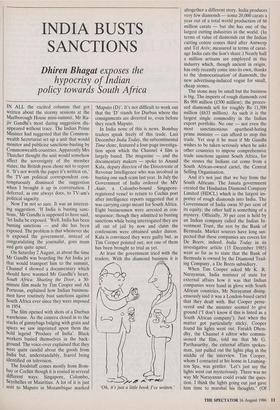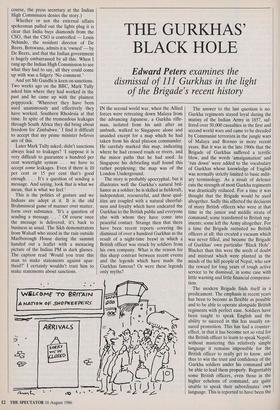INDIA BUSTS SANCTIONS
Dhiren Bhagat exposes the
hypocrisy of Indian policy towards South Africa
IN ALL the excited columns that got written about the stormy sessions at the Marlborough House mini-summit, Mr Ra- jiv Gandhi's most daring suggestion dis- appeared without trace. The Indian Prime Minister had suggested that the Common- wealth Secretariat set up a unit that would monitor and publicise sanctions-busting by Commonwealth countries. Apparently Mrs Thatcher thought the unit would somehow affect the sovereignty of the member states; the British press chose not to report it. 'It's not worth the paper it's written on,' the TV-am political correspondent con- temptuously dismissed the suggestion when I brought it up in conversation. I deferred, as one always does, to TV-am's political sagacity.
Now I'm not so sure. It was an interest- ing suggestion. 'If India is busting sanc- tions,' Mr Gandhi is supposed to have said, let India be exposed.' Well, India has been busting sanctions — and she has been exposed. The problem is that whenever she is exposed the government, instead of congratulating the journalist, goes mum and gets quite upset.
On Saturday 2 August, at about the time Mr Gandhi was boarding the Air India jet that would transport him to the summit, Channel 4 showed a documentary which Should have warmed Mr Gandhi's heart. South Africa: Shutting the Door, a 30- minute film made by Tim Cooper and Ali Porteous, explained how Indian business- men have routinely bust sanctions against South Africa ever since they were imposed in 1954.
The film opened with shots of a Durban warehouse. As the camera closed in to the stacks of gunnybags bulging with grain and Spices we saw imprinted upon them the bold legend 'Produce of India'. Black workers busied themselves in the back- ground. The voice-over explained that they were quite candid about the goods from India but, understandably, feared being identified on television.
The foodstuff comes mostly from Bom- bay or Cochin though it is routed in several different ways: Singapore, Colombo, Seychelles or Mauritius. A lot of it is just sent to Maputo in Mozambique marked 'Maputo (D)'. It's not difficult to work out that the 'D' stands for Durban where the consignments are diverted to, even before they reach Maputo.
In India none of this is news. Bombay traders speak freely of this trade. Last December India Today, the subcontinental Time clone, featured a four-page investiga- tion upon which the Channel 4 film is largely based. The magazine — and the documentary makers — spoke to Anand Kala, deputy director of the Directorate of Revenue Intelligence who was involved in busting one such scam last year. In July the Government of India ordered the MV Atair, a Colombo-bound Singapore- registered vessel to return to Cochin port after intelligence reports suggested that it was carrying cargo meant for South Africa. Eight businessmen were arrested in con- sequence; though they admitted to busting sanctions while being interrogated they are all out of jail by now and claim the confessions were obtained under duress. Kala is convinced they were guilty but, as Tim Cooper pointed out, not one of them has been brought to trial as yet.
At least the government tried with the traders. With the diamond business it is 'Oh, it's just a little book I've written.' altogether a different story. India produces very few diamonds — some 20,000 carats a year out of a total world production of 66 million carats — but she has one of the largest cutting industries in the world. (In terms of value of diamonds cut the Indian cutting centre comes third after Antwerp and Tel Aviv; measured in terms of carat- age India cuts the lion's share.) Nearly half a million artisans are employed in this industry which, though ancient in origin, has only recently come into its own, thanks to the 'democratisation' of diamonds, the new advertising-induced vogue for small, cheap stones.
The stone may be small but the business is big. The imports of rough diamonds cost Rs 900 million (£500 million); the proces- sed diamonds sell for roughly Rs 11,500 million (£633 million). As such it is the largest single commodity in the Indian export portfolio. No one — not even the most sanctimonious apartheid-hating prime minister — can afford to stop this trade. Yet stop it he must if Mr Gandhi wishes to be taken seriously when he asks other countries to impose comprehensive trade sanctions against South Africa, for the stones the Indians cut come from a South African-owned cartel, the Central Selling Organisation.
And it's not just that we buy from the South Africans. The Janata government created the Hindustan Diamond Company Limited (HDCL) which is the largest im- porter of rough diamonds into India. The Government of India owns 50 per cent of its equity; the other half is something of a mystery. Officially, 30 per cent is held by an Indian company called the Indian In- vestment Trust, the rest by the Bank of Bermuda. Market sources have long sus- pected that these companies are covers for De Beers; indeed, India Today in its investigative article (15 December 1985) went so far as to state that the Bank of Bermuda is owned by the Diamond Trad- ing Company, a De Beers subsidiary.
When Tim Cooper asked Mr K. R. Narayanan, India minister of state for external affairs how it was that Indian companies were hand in glove with South African countries, Mr Narayanan dising- enuously said it was a London-based cartel that they dealt with. But Cooper perse- vered and the minister seemed to give ground (`I don't know if this is listed as a South African company'). Just when the matter got particularly sticky, Cooper found his lights went out. Farukh Dhon- dhy, the Channel 4 editor who commis- sioned the film, told me that Mr G. Parthasarthy, the external affairs spokes- man, just pulled out the lights plug in the middle of the interview. Tim Cooper, whom I contacted at his home in Leaming- ton Spa, was gentler. 'Let's just say the lights went out mysteriously. There was no way Mr Narayanan could evade the ques- tion. I think the lights going out just gave him time to marshal his thoughts.' (Of course, the press secretary at the Indian High Commission denies the story.) Whether or not the external affairs spokesman pulled out the lights plug it is clear that India buys diamonds from the CSO, that the CSO is controlled — Louis Nchindo, the resident director of De Beers, Botswana, admits it is 'owned' — by De Beers, and that the Indian government is hugely embarrassed by all this. When I rang up the Indian High Commission to see what they had to say, all they could come up with was a fidgety 'No comment.'
And yet Mr Gandhi is keen on sanctions. Two weeks ago on the BBC, Mark Tully asked him where they had worked in the past and he came up with the plainest poppycock: 'Wherever they have been used unanimously and effectively they have worked. Southern Rhodesia at that time. In spite of the tremendous leakages through South Africa they did bring about freedom for Zimbabwe.' I find it difficult to accept that my prime minister believes any of this.
Later Mark Tully asked, didn't sanctions always lead to leakages? 'I suppose it is very difficult to guarantee a hundred per cent watertight system . . . we have to accept some leakages. Even if there is 10 per cent or 15 per cent that's good enough. . . It's a question of sending a message. And saying, look that is what we mean, that is what we feel.'
This is the politics of gesture and we Indians are adept at it. It is the old Brahminical game of manner over matter, form over substance. 'It's a question of sending a message. . . Of course once the message is delivered, it's back to business as usual. The Sikh demonstrators from Walsall who stood in the rain outside Marlborough House during the summit handed out a leaflet with a menacing picture of the Indian PM in dark glasses. The caption read 'Would you trust this man to make statements against apar- theid?' I certainly wouldn't trust him to make statements about sanctions.











































 Previous page
Previous page